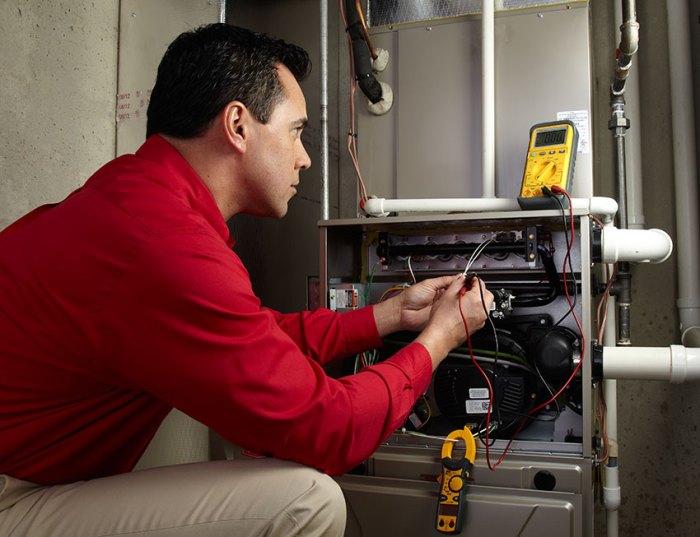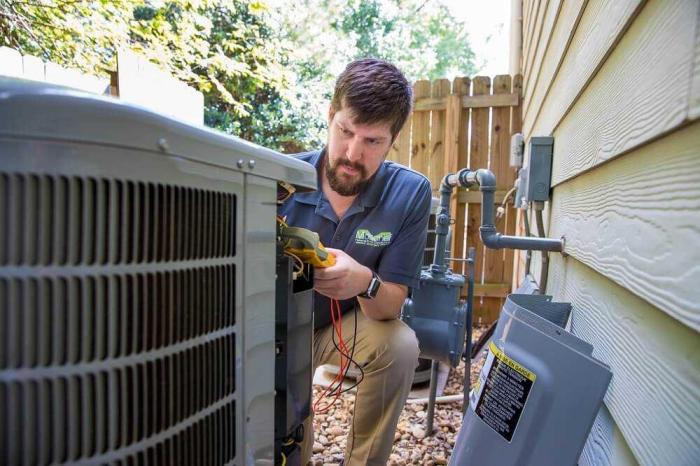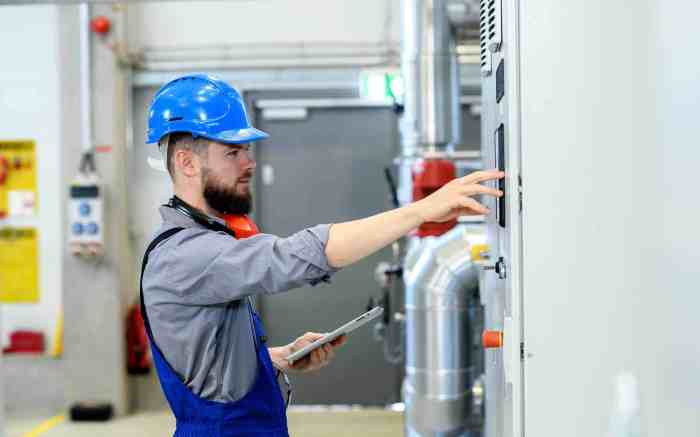Crafting an Effective HVAC Emergency Repair Strategy
When it comes to HVAC emergency repair, immediate action can make all the difference. From potential risks of neglect to the impact on system longevity, understanding the importance of quick responses is key. Let's delve into common scenarios, steps to take during emergencies, and the debate between DIY and professional repairs.
Stay informed to keep your HVAC system running smoothly.
Importance of HVAC Emergency Repair

Immediate attention to HVAC emergencies is crucial to ensure the comfort and safety of occupants. When HVAC systems malfunction during extreme weather conditions, such as heatwaves or cold snaps, it can lead to serious health risks and discomfort.
Potential Risks of Neglecting HVAC Issues During Emergencies
- Health hazards: Poor indoor air quality resulting from HVAC issues can exacerbate respiratory problems and allergies.
- Property damage: Leaking pipes, faulty wiring, or malfunctioning components can lead to water damage, electrical fires, or other costly issues.
- Decreased energy efficiency: Neglected HVAC systems consume more energy, leading to higher utility bills and unnecessary expenses.
Impact of Timely Repairs on the Longevity of HVAC Systems
Regular maintenance and prompt repairs can significantly extend the lifespan of HVAC systems, saving you money in the long run. By addressing issues promptly, you can prevent minor problems from escalating into major repairs or replacements.
Common HVAC Emergency Scenarios
In the midst of extreme weather conditions or unexpected malfunctions, HVAC emergencies can arise, causing discomfort and potentially hazardous situations for occupants. Identifying common HVAC emergency scenarios and understanding their underlying causes is crucial for prompt resolution and prevention of further damage.
1. Refrigerant Leaks
Refrigerant leaks are a common HVAC emergency that can lead to inefficient cooling or heating and potential health risks. These leaks are often caused by wear and tear on the system components, corrosion, or poor installation practices. Inadequate maintenance and regular wear can exacerbate these issues, resulting in a sudden breakdown of the HVAC system.
2. Electrical Failures
Electrical failures in HVAC systems can occur due to faulty wiring, overloaded circuits, or power surges. These failures can disrupt the functioning of the system, leading to a complete breakdown or even posing a fire hazard. Adverse weather conditions such as lightning strikes or power outages can further escalate these emergencies, requiring immediate attention from a professional technician.
3. Clogged Air Filters
Clogged air filters restrict airflow in the HVAC system, causing strain on the blower motor and reducing the system's efficiency. This can result in overheating, system malfunctions, or even a complete shutdown. During extreme weather conditions like heatwaves or cold spells, the demand on the HVAC system increases, making clogged air filters more likely to cause emergencies.
4. Thermostat Malfunctions
Thermostat malfunctions can lead to inaccurate temperature readings, causing the HVAC system to run inefficiently or not at all. These malfunctions can be triggered by faulty wiring, dead batteries, or sensor issues. In times of extreme weather, a malfunctioning thermostat can worsen the indoor climate conditions, necessitating immediate repair or replacement.
Steps to Take During an HVAC Emergency

During an HVAC emergency, it's crucial to act quickly and effectively to prevent further damage to your system. Here is a step-by-step guide for homeowners facing an HVAC emergency.
Safely Shutting Down HVAC Systems
When facing an HVAC emergency, it's essential to know how to safely shut down your system to prevent any additional damage. Follow these steps:
- First, locate the emergency shut-off switch on your HVAC system. This switch is typically located near the unit or on the wall nearby.
- Turn off the power to your HVAC system by flipping the switch to the "off" position.
- Next, turn off the gas supply to your furnace if you have a gas-powered system. This step is crucial for safety in case of a gas leak.
- If you have a water leak or a burst pipe related to your HVAC system, turn off the water supply to prevent flooding.
- Once you have safely shut down your HVAC system, do not attempt to restart it until a professional technician has inspected and repaired the issue.
Contacting Professional HVAC Emergency Repair Services
While you can take certain initial steps to address an HVAC emergency, it's important to know when to contact professional HVAC emergency repair services. Consider the following situations:
- If you are unable to identify the cause of the HVAC emergency or if the issue seems complex, it's best to contact a professional technician.
- When there is a strong gas smell coming from your HVAC system, evacuate your home immediately and contact emergency services and a qualified HVAC technician.
- If your HVAC system is making unusual sounds, producing strange odors, or not functioning properly, it's advisable to seek professional help to avoid further damage.
- Regular maintenance and inspection by professional HVAC technicians can help prevent emergencies, so consider scheduling routine check-ups to keep your system in optimal condition.
DIY vs. Professional HVAC Emergency Repairs

When faced with an HVAC emergency, homeowners often contemplate whether to attempt a do-it-yourself (DIY) repair or seek the expertise of professional technicians. Both options come with their own set of advantages and disadvantages, along with varying levels of risk and benefits.
Advantages and Disadvantages of Attempting DIY Repairs
- Advantages:
- Cost-effective: DIY repairs can save money on labor costs.
- Immediate action: You can start working on the issue without waiting for a technician.
- Sense of accomplishment: Successfully fixing the problem yourself can be rewarding.
- Disadvantages:
- Lack of expertise: Limited knowledge and experience may lead to improper repairs.
- Safety concerns: Working with HVAC systems can be dangerous without proper training.
- Voided warranties: DIY repairs can void warranties on HVAC equipment.
Risks Involved in DIY HVAC Emergency Repair Attempts
- Electrical hazards: Incorrect handling of electrical components can result in shocks or fires.
- Refrigerant leaks: Mishandling refrigerants can pose health risks and damage the environment.
- System damage: Incorrect repairs can lead to further damage to the HVAC system.
Benefits of Hiring Professional Technicians for Emergency Repairs
- Expertise: Trained technicians have the knowledge and skills to diagnose and fix HVAC issues accurately.
- Safety: Professionals follow proper safety protocols to ensure a secure repair process.
- Long-term solutions: Professional repairs are more likely to provide lasting solutions to HVAC problems.
Final Wrap-Up
In conclusion, navigating HVAC emergencies requires a blend of quick thinking and informed decision-making. By grasping the significance of timely responses and weighing DIY versus professional repairs, you can ensure your HVAC system stays reliable. Stay proactive to avoid potential pitfalls and enjoy a comfortable living environment.
FAQ Insights
What are the risks of neglecting HVAC emergencies?
Neglecting HVAC emergencies can lead to further damage to the system, higher repair costs, and discomfort in your living space.
When should I contact professional HVAC emergency repair services?
You should contact professional services when you are unsure about the severity of the issue, or if you cannot safely resolve the problem on your own.
Is attempting DIY repairs a good idea during HVAC emergencies?
DIY repairs can be risky during emergencies as you might exacerbate the problem or cause harm to yourself. It's best to assess the situation carefully before deciding.



